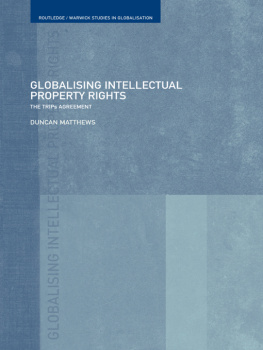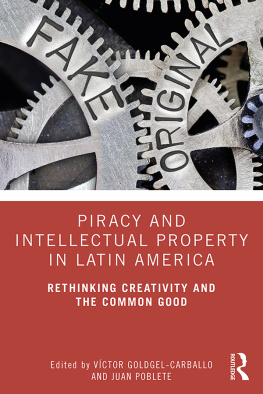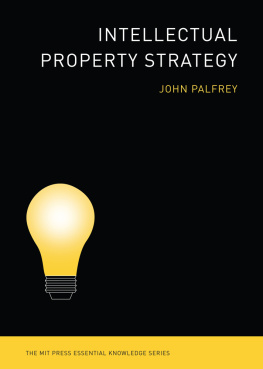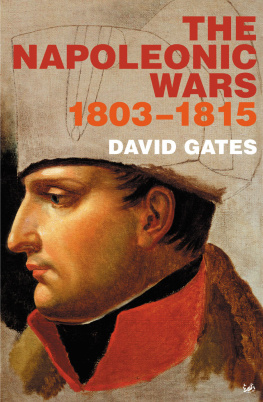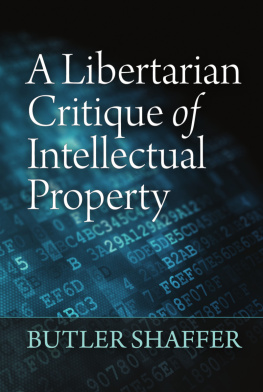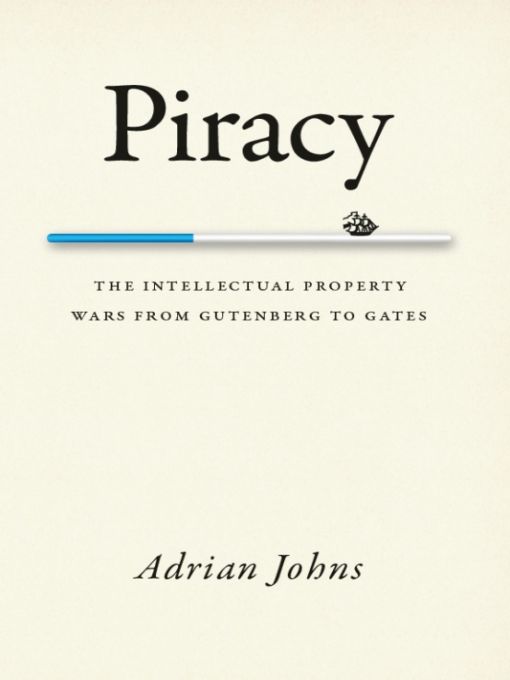
Table of Contents
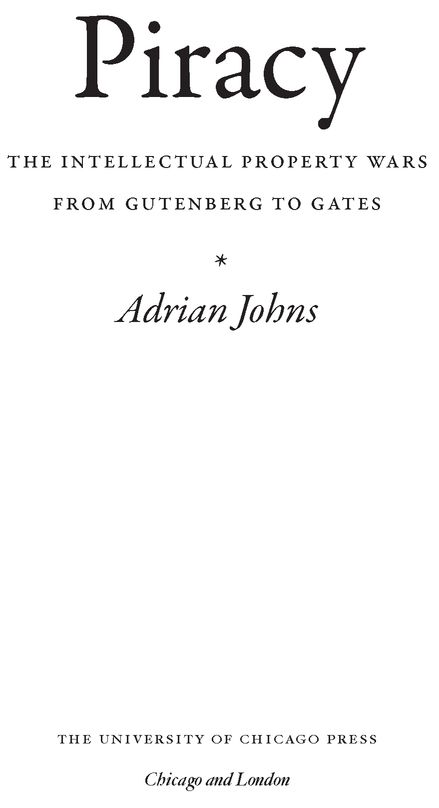
ADRIAN JOHNS is professor of history and chair of the Committee on Conceptual and Historical Studies of Science at the University of Chicago, and the author of The Nature of the Book: Print and Knowledge in the Making (1998), published by the University of Chicago Press.
The University of Chicago Press, Chicago 60637
The University of Chicago Press, Ltd., London
2009 by Adrian Johns
All rights reserved. Published 2009
Printed in the United States of America
18 17 16 15 14 13 12 11 10 09
1 2 3 4 5
ISBN-13: 978-0-226-40118-8 (cloth) ISBN-10: 0-226-40118-9 (cloth)
eISBN : 97-8-022-64012-0
Library of Congress Cataloging-in-Publication Data
Johns, Adrian.
Piracy : the intellectual property wars from Gutenberg to Gates / Adrian Johns. p. cm.
Includes bibliographical references and index.
ISBN-13: 978-0-226-40118-8 (cloth: alk. paper)
ISBN-10: 0-226-40118-9 (cloth: alk. paper)
1. Intellectual property infringementHistory. 2. Piracy (Copyright)History. 3. Copyright infringementHistory. 4. Software piracyHistory. 5. PrintingHistory. I. Title. K1401.J645 2009
346.048dc22
2009017513
The paper used in this publication meets the minimum requirements of the American National Standard for Information SciencesPermanence of Paper for Printed Library Materials, ANSI Z39.48-1992.
For David.
And it is, it is a glorious thing
To be a Pirate King!
A General History of the Pirates
In mid-2004, executives at the Tokyo headquarters of the huge electronics multinational NEC began to hear reports that its products were being counterfeited and sold in Chinese stores. Nobody was at all surprised. Reports of this kind were routine for any corporation of NECs size and reach, and in this case they initially seemed to concern small stuffblank DVDs and the like. The company nevertheless moved swiftly to put into action its standard response in such cases, hiring a firm called International Risk to look into the matter. There was no reason to suspect that this would prove to be anything more than yet another incident like all the othersirritating, no doubt, but impossible to suppress entirely. Piracy of this kind was the unavoidable price of doing business on a global scale.
Two years, half a dozen countries, and several continents later, what International Risk had unveiled shocked even the most jaded experts in todays industrial shenanigans. They revealed not just a few streetwise DVD pirates, but an entire parallel NEC organization. As the real companys senior vice president ruefully remarked, the pirates had attempted to completely assume the NEC brand. Their version, like the original, was multinational and highly professional. Its agents carried business cards. They were even recruited publicly by what looked like legitimate advertising.
When news of the pirate NEC broke in mid-2006, the story quickly winged its way across the Internet. Readers and commentators in the blogosphere reproduced the original press reports many times over. They expressed dismay at the implications. But their dismay was often accompanied by a drop of schadenfreude. Now, they realized, none of them could really be confident that the NEC disk drives, chips, screens, or keyboards on which they were doing their blogging were what they claimed to be. Some found this ominous, because of what it implied about knowledge in general in the networked world. Others acknowledged those implications but were only too happy to profess that they found them appealing: here was a gigantic corporation coming a cropper at the hands of unbranded outlaws who had proved themselves faster, nimbler, smarter. The Nets echo-chamber amplified the incident into a symbol of every cultural fear, epistemic doubt, and libertarian dream suggested by the digital age. Here, it seemed, was a glimpse of where everyday menaces like phishing and identity theft were inexorably leading.
This case of a doppelgnger multinational does indeed seem to mark some kind of culmination. It is hard to imagine a more spectacular act of piracy, unless perhaps one could conjure up a fake World Intellectual Property Organization. And in fact the venture came to light almost exactly on cue, just as impersonation of this kind had been identified as a growing piratical trend, set to succeed hacking and pharming as the mode of digital banditry du jour. Brandjacking, it was called. It had even been singled out as a looming problem by the CEO of International Riskwho, not coincidentally, was a longtime veteran of the Hong Kong police experienced in tackling human kidnappings. Such piracy, he had cautioned in public speeches, was fast becoming a fact of life for the electronics and pharmaceuticals industries, with a recognizable modus operandi. An episode generally began when a legitimate company licensed a factory to manufacture its goods; the brandjackers who stood behind the factory would then take the documentation involved in the license, duplicate it, and redeploy it in order to recruit other plants. These other operations often remained blissfully unaware that they were dealing with impostors. After all, the outlaws helped themselves to the very devicesaffidavits, bills, forms, contractsthat are supposed to guarantee legitimacy in modern capitalism. Especially hard to fight were brandjackers who operated across national boundaries, particularly the strait separating Taiwan from mainland China. The authorities in the Peoples Republic might well prove reluctant to prosecute local businesses that could plausibly claim to be acting in innocence. All of these vulnerabilities were exploited to the full by NECs evil twin.
NECs discomfiting experience throws into sharp relief the sheer range of phenomena that fall under the term piracy as it is nowadays used. They extend far beyond the piecemeal purloining of intellectual property. They reach, in fact, to the defining elements of modern culture itself: to science and technology; to authorship, authenticity, and credibility; to policing and politics; to the premises on which economic activity and social order rest. That is why the topic of piracy causes the anxiety that it so evidently does. Ours is supposed to be an age of informationeven of an information revolution. Yet it suddenly seems as though enemies of intellectual property are swarming everywhere, and the ground rules for an information economy are nowhere secure. Universities find themselves havens for countless devotees of file-sharing software, making blithe use of services that the recording industry condemns flatly as piracy. Biotechnology companies, testing genetically modified organisms in Indian cotton fields, accuse local farmers of being seed pirates when they use part of one years crop as seed for the next. And Hollywood executives make front-page headlines when their companies join forces to sell movies online, having been spurred into rare cooperation by their mutual fear of losing control of their intellectual property. So serious has the prospect of piracy become for them that in the United States the Digital Millennium Copyright Act has even outlawed the promulgation of algorithms that might be used to disable or circumvent copy-protection devices. A graduate student coming to Nevada to present a technical paper can be arrested, not for pirating anything himself, but for divulging principles that might allow others to do so. In todays global economy, there are not just pirate books, CDs, and videos, but pirate jeans, pirate motorcycles, pirate pharmaceuticals, pirate aircraft parts, and, of course, pirate Pokemon. One recent novel mischievously imagines the ruin of the entire U.S. economy after the source code of major proprietary software is released en masse onto the Net. The Chinese never liked intellectual property, explains a Nobel laureate scientist in 2044, and they eventually called our bluff. So now, thanks to the Chinese, basic science has lost its economic underpinnings. We have to live on pure prestige now, and thats a very thin way to live.
Next page



